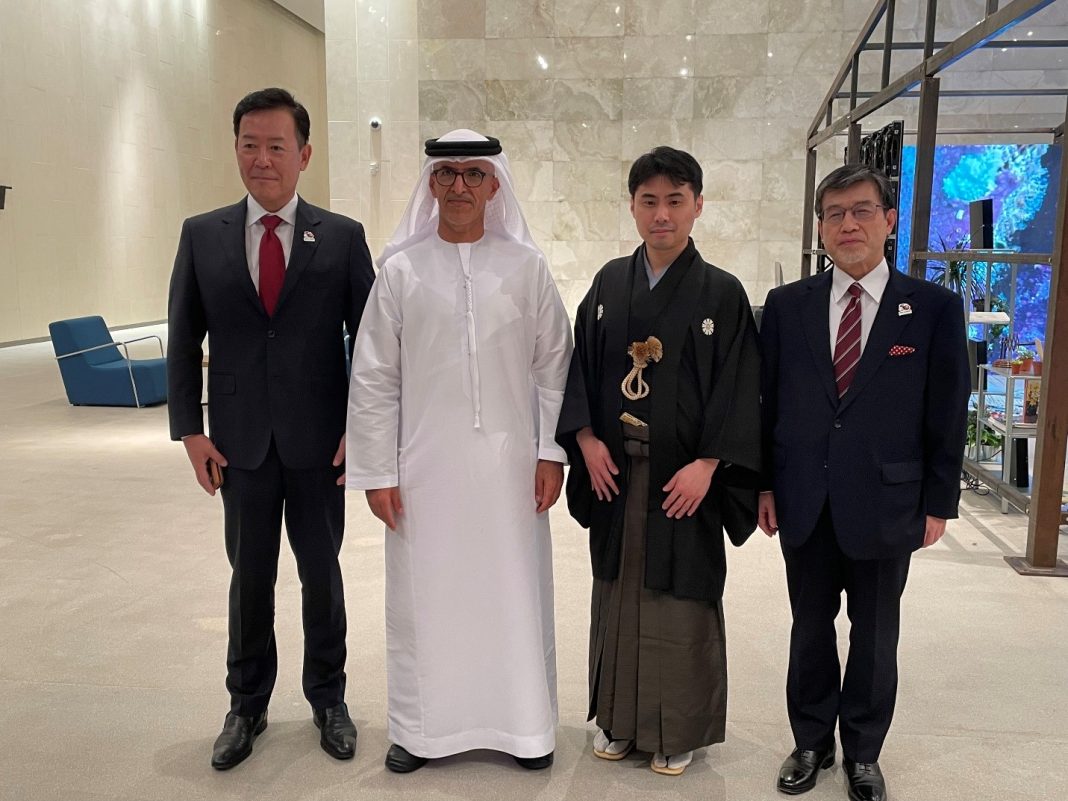Traditional cultural concerts held to celebrate 50th anniversary of the diplomatic relations between Japan and the UAE
In commemoration of the 50th anniversary of the establishment of diplomatic relations between Japan and the UAE, concerts featuring the traditional performing arts of the two countries were held in Abu Dhabi and Dubai on March 2 and 4, respectively, by Hosho School of Noh. Noh is one of the Japanese traditional theatrical performances which has 700 years in history and is also one of UNESCO’s Intangible Cultural Heritages.
Mr. Kazufusa Hosho, the 20th Grand Master of Hosho School of Noh and 19 artists from Japan performed Noh and Gagaku, while Nabati and Oud from the UAE were staged.
H.E. Dr. Mugheer Khamis Al Khaili, Chairman of Department of Community Development, Dr Ali Bin Tamim, Secretary General of Sheikh Zayed Book Award and H.E. Mr. Akio Isomata, Ambassador of Japan to the UAE graced the performance in Abu Dhabi on 2 March. Mr. Noboru Sekiguchi, Consul-General of Japan in Dubai and the Northern Emirates, Emiratis, Japanese community, and several other countries’ diplomats were present at the performance in Dubai on 4 March.
In the first half of the performance in Dubai, Oud, a traditional musical instrument of the UAE, and Biwa, a traditional musical instrument that came to Japan around the ninth century via the Silk Road, were played, allowing the audience to enjoy the connection between Arab and Japanese cultures beyond time and space.
In the second half, Khalid Albudoor, an award-winning poet and consultant on culture and heritage in Dubai, gave an explanation and demonstration of Nabati, followed by an acrobatic performance of “Ko-Kaji” from the Noh repertoire, in which a swordsmith and a sword spirit work together to make a sword for the king.
The program was directed by Mr.Kazufusa Hosho, the 20th generation Grand Master of the Hosho School of Noh in Japan, who has been involved in many international, including diplomatic, events. These include the Milan Expo, the Milano Triennale, and the Japan–Vatican diplomatic mission. He also performed Noh in the UAE in 2019.
Hosho said that, on this occasion, this project was also intended to introduce Arab culture to Japan.
Hosho stated: “Not surprisingly, there is Arab influence in traditional Japanese culture. In order to understand the roots of our culture, we need to know more about Arab culture. I have come across a wonderful culture called Nabati. I hope that, through this project, we not only introduce Japanese culture to the Arab world, but also help to introduce Arab culture to Japan.
The stage design was created by Mr.Yuki Tsuji, the first Ikebana artist to ever perform at Carnegie Hall in New York. The symbolic installation “Tree of Rebirth” incapsulates the idea of regeneration from the global pandemic. Tsuji states “Even abandoned plants can be revived as art for a sustainable world. I want to share this unique Japanese spirit of regeneration with the world.”
The Hosho School, which hosted the event, is a Japanese Noh school with a history that dates back about 650 years. Hosho school is known for its profound artistic style and melodic chanting and, because it was loved by successive shoguns, the school has many artifacts in its collection, including Noh masks and costumes used in Noh plays. Some of these masterpieces have been designated as Japan’s national treasures. In the Noh play “Ko-Kaji,” performed in Abu Dhabi and Dubai, a gold-covered Noh mask, “Kotobide,” which was made about three hundred years ago, was used, and other special costumes made of woven platinum fascinated the audience. The performance was supported by Agency for Cultural Affairs of Japan, UAE-Japan Society, Emirates Airlines and Embassy of Japan in the UAE.









